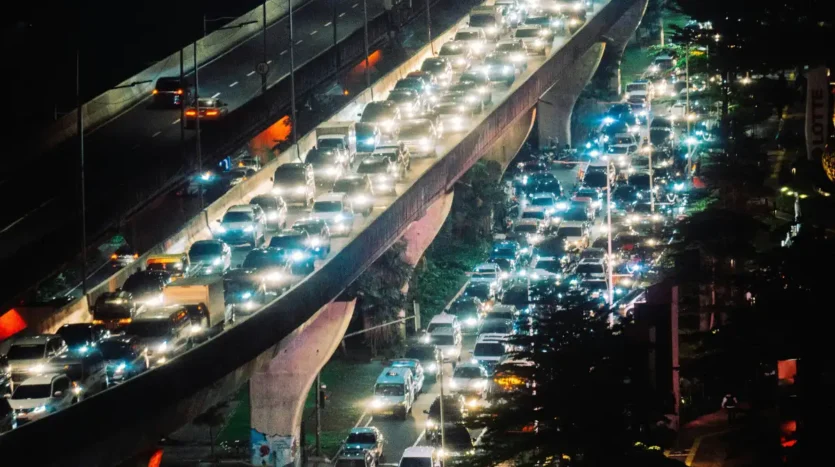Expat Guide to Beating Jakarta Rush Hour and Heavy Traffic
Expat Guide to Beating Jakarta Rush Hour and Heavy Traffic
Jakarta has long been recognized as one of the most dynamic cities in Southeast Asia, but it is also notorious for something less glamorous, its traffic. According to the TomTom Traffic Index, Jakarta consistently ranks among the most congested cities in the world, with drivers spending an average of 39 percent more travel time compared to free-flow conditions. For expatriates relocating to Indonesia’s capital, this reality is more than just an inconvenience. Daily commuting can easily become a source of frustration that affects work performance, family life, and overall wellbeing.
Yet while traffic is unavoidable, it does not have to define your Jakarta experience. With the right housing decisions, careful neighborhood selection, and smart commuting strategies, expats can significantly reduce time lost on the road. This guide explores how to balance property choices with lifestyle adaptations, helping you make the most of your time in the city while keeping Jakarta’s infamous rush hour from taking over your day.
Why Jakarta Traffic Matters for Expats
To understand why traffic should be a central consideration in your relocation plan, it is worth looking at the data. Studies show that average commuting times in Jakarta range from 1.5 to 2 hours per day, with peak hours typically occurring between 7 and 9 in the morning and 5 and 8 in the evening. The city’s rapid growth, high population density, and limited road capacity all contribute to this situation.
For expatriates, the impact goes beyond being stuck in gridlock. Long commutes can eat into valuable time that could otherwise be spent with family or enjoying the city’s cultural attractions. Parents worry about school runs taking too long, while professionals often find themselves starting the workday already drained. Housing choices, therefore, become more than a lifestyle preference, they are a strategic decision to balance convenience, comfort, and productivity.
Choosing the Right Neighborhoods to Minimize Commute
One of the first and most important decisions for expats is choosing where to live. Jakarta is not a small city, and location directly affects how much time you spend on the road.
For professionals working in the Central Business District (CBD), neighborhoods like Sudirman, Kuningan, and the Sudirman Central Business District (SCBD) are highly attractive. Apartments in these areas are often within walking distance of major office towers, reducing the need for lengthy commutes. While rental prices here can be higher, many expats find the time saved is well worth the cost.
Families often look toward more residential and lifestyle-oriented neighborhoods such as Kemang, Pondok Indah, and Menteng. These areas offer spacious housing, international schools, and a strong sense of community, but the trade-off is that daily commutes into the CBD can be longer, especially during rush hour. For families with school-age children, however, living close to international schools often outweighs the inconvenience of occasional traffic delays.
Another option is to stay near Jakarta’s expanding public transport network. Areas like Setiabudi, Senayan, and Blok M have become increasingly popular with expats due to their proximity to MRT and TransJakarta bus routes. Living near a station allows for more predictable commuting times and a lower reliance on cars. For those working in South Jakarta or even further out in Tangerang, new suburban developments such as BSD City and Alam Sutera offer modern housing with larger living spaces, although commuting to the city center can be demanding unless your office is nearby.
Housing Options That Help Beat the Traffic
Beyond location, the type of housing you choose can also influence your daily routine. Many expats opt for serviced apartments, especially in the first year of relocation. These properties are often centrally located and come with facilities like gyms, pools, and in some cases, shuttle services to nearby business hubs. For singles and couples, serviced apartments offer convenience and flexibility without the hassle of long-term commitments.
Luxury condominiums are another popular choice, particularly those located close to office towers and shopping centers. Properties in areas such as SCBD or Mega Kuningan not only cut down commuting time but also provide amenities that reduce the need for frequent trips around the city. Having a supermarket, coworking space, or childcare services within the same complex can significantly ease daily life.
Corporate housing remains a reliable solution for companies relocating staff. Multinational firms often prioritize location and accessibility over rental costs, understanding that reducing commuting stress helps employees maintain higher productivity and satisfaction. Facilities like dedicated parking, in-house maintenance, and round-the-clock security add to the appeal.
When choosing housing, expats should also consider small but important details that save time. Proximity to grocery stores, international schools, and healthcare facilities can mean fewer hours spent in traffic. A well-located apartment with integrated facilities may cost more upfront, but the convenience it brings often makes it a smart investment.
Read also: Best Sport Centers for Expats in Central Jakarta
Smart Commuting Solutions for Expats
Even with the right housing choice, commuting cannot always be avoided. Fortunately, Jakarta has been making progress in improving public transportation.
The MRT Jakarta, which currently runs from Lebak Bulus in the south to Bundaran HI in the center, has become a game-changer for daily commuters. Expats living near MRT stations can cut travel times dramatically compared to driving during peak hours. The system is modern, reliable, and designed to expand further into the city in the coming years.
The LRT, which connects eastern suburbs like Cibubur to the central area of Dukuh Atas, is another step toward easing congestion. While still developing, it provides a useful alternative for those commuting from areas previously heavily dependent on cars.
TransJakarta buses are also widely used, with dedicated bus lanes that bypass some of the city’s worst bottlenecks. For many expats, these buses offer a surprisingly efficient option, especially for medium-distance commutes.
Ride-hailing apps such as Gojek and Grab have become an integral part of Jakarta life. They provide affordable and flexible transportation for both short and long trips, with motorcycle taxis offering a way to weave through gridlocked streets. For families and those who prefer predictability, hiring a private driver remains common. While owning a car is possible, most expats find renting or leasing with a driver more practical given the challenges of parking and navigation.
Cycling is emerging as a niche commuting option, with new bike lanes introduced in parts of the city. However, safety concerns and weather conditions limit its appeal to specific areas, usually within the CBD.
Lifestyle Hacks to Avoid Jakarta Rush Hour
Beating Jakarta traffic is not just about where you live or how you commute, it is also about how you plan your lifestyle. Many multinational companies in Jakarta now offer flexible working hours or hybrid arrangements, allowing employees to avoid peak commuting times. Adjusting your daily schedule by even 30 minutes can sometimes make a noticeable difference in travel duration.
Coworking spaces are another useful option. Facilities such as WeWork, GoWork, and CoHive are located in strategic districts, giving expats the flexibility to work closer to home or outside traditional offices when needed.
Technology also plays a role in reducing unnecessary trips. Jakarta has a highly developed delivery ecosystem, from groceries to restaurant meals and household essentials. Using online services for routine errands can save hours each week that would otherwise be spent navigating congested roads.
For families, proximity to international schools is a critical factor. Long school runs can quickly become a burden, so many expats prioritize housing within 15 to 20 minutes of their children’s schools. Similarly, being near hospitals and recreational facilities helps reduce travel needs while ensuring peace of mind.
The Future of Jakarta’s Traffic and What It Means for Expats
Looking ahead, there are reasons for cautious optimism. The government is investing heavily in infrastructure projects such as MRT Phase 2, LRT extensions, and new toll roads. The introduction of electronic road pricing (ERP) and the continuation of the odd-even license plate policy aim to manage congestion more effectively.
While these measures will take time to fully materialize, they signal a positive direction. For expats planning a long-term stay, it means that choosing housing near current or future transport hubs may prove beneficial not just today but in the years to come.
Read also: Public Transport in Jakarta: Easy Guide for New Expats 2025
Final Thoughts – Living Smart in Jakarta as an Expat
Jakarta’s traffic is often described as overwhelming, yet for many expatriates the city offers opportunities and experiences that outweigh the challenges. The key lies in making informed choices. Selecting the right neighborhood, prioritizing housing that reduces daily commuting, and adopting smart lifestyle strategies all contribute to a smoother experience.
While the gridlock may never fully disappear, expats who approach Jakarta with flexibility and foresight can find ways to thrive. With modern apartments near business districts, expanding public transport options, and lifestyle adjustments that make daily life more efficient, the city becomes far more manageable. Living in Jakarta as an expat is ultimately about balance, and those who strike it well will find themselves not just enduring the traffic but enjoying all that the capital has to offer.
Featured image by Marcel Ardivan on Unsplash












